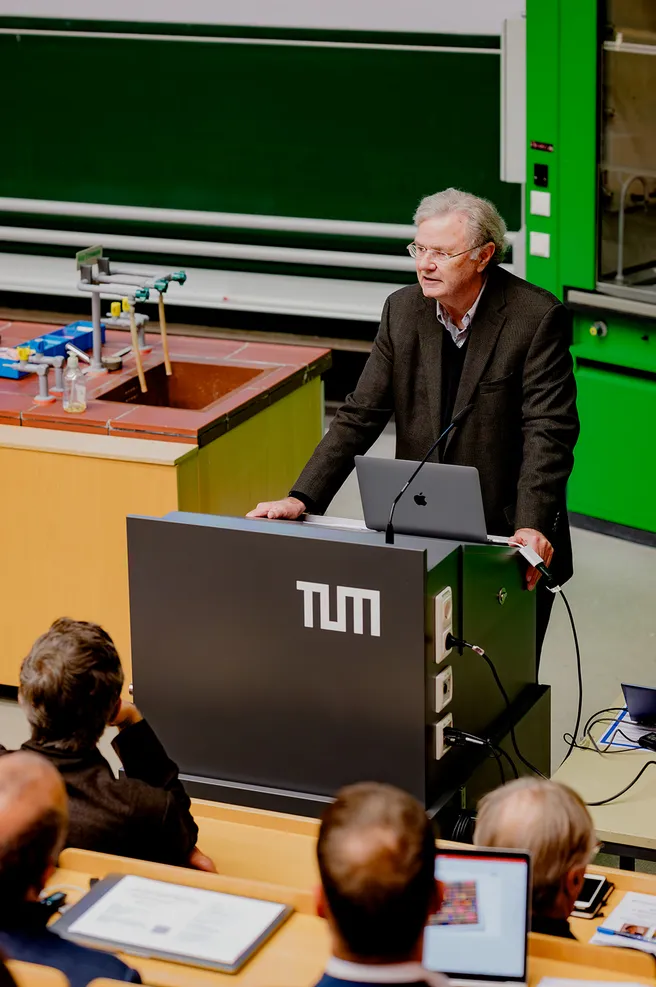On November 4, 2024, the 28th Hans Fischer Symposium took place in Garching, hosted by the Hans Fischer Society. From 1:00 p.m. to 6:00 p.m., renowned scientists, young researchers, and students gathered to discuss the latest developments in electron microscopy and to honor the legacy of Prof. Sevil Weinkauf and Prof. Luis Bachmann.
Welcome by Prof. Eisenreich and Introduction to the Hans Fischer Society
Prof. Wolfgang Eisenreich (TUM), Chair of the Hans Fischer Society, opened the symposium with a welcoming message. He introduced Hans Fischer, Nobel laureate and namesake of the society, who, as the successor to Nobel laureate Heinrich Wieland, significantly influenced research in the field of structural organic chemistry. Since its founding in 1950, the Hans Fischer Society has supported research projects connected to Fischer’s scientific interests. In the past decade alone, approximately 1.5 million euros have been invested in research projects. Additionally, the Hans Fischer College supports students at the Technical University of Munich (TUM) conducting research in Fischer's fields of expertise. Prof. Eisenreich expressed his gratitude to Prof. Johannes Buchner (TUM) and Prof. Wolfgang Baumeister (TUM), co-organizers of the symposium, for their support.
Tribute to Prof. Luis Bachmann and Prof. Sevil Weinkauf
In moving speeches, Baumeister, Dr. Christoph Kaiser, and Dr. Carsten Peters commemorated recently deceased scientists Prof. Luis Bachmann and Prof. Sevil Weinkauf. Prof. Bachmann (1929–2023) began his professorship in 1969 and served until 1998. As doctoral advisor and mentor to Prof. Weinkauf, he played a central role in the development of cryo-electron microscopy (Cryo-EM).
Weinkauf (1957–2022) received the Young Investigator Award from the German Society for Electron Microscopy in 1989 and the Hans Fischer Memorial Award in 1996. She completed her postdoctoral studies with Prof. Johann Deisenhofer (University of Texas Dallas Medical Center, USA) before stepping into Prof. Bachmann's role as Professor of Electron Microscopy in 1998. Her former postdoctoral fellows, Kaiser and Peters, praised her tireless research spirit, critical approach, and extraordinary attention to detail. Weinkauf’s research on protein crystallization and stability continues to influence the field, with many of her projects being carried on in laboratories worldwide.
Scientific Presentations at the Symposium
The scientific program began with a series of lectures chaired by Prof. Buchner. Prof. Baumeister from the Max Planck Institute (MPI) in Martinsried opened with his presentation, "Cryo-electron tomography: The power of seeing the whole picture," highlighting how cryo-electron tomography enables the visualization of biological structures in a comprehensive, three-dimensional format, enhancing the understanding of molecular processes.
Next, Prof. Carina Oliveira Mann (TUM) presented "Solving structures of small sub-100 kDa proteins with cryo-EM," discussing the challenges and solutions that cryo-EM offers for studying small proteins. The third lecture of the first session was given by Prof. Marc-Georg Willinger (TUM), who spoke on "Electron microscopy of dynamic systems under non-equilibrium conditions," showcasing how electron microscopy can be used to study dynamic systems.
After a coffee break, Prof. Michael Sattler (TUM) chaired the second session. Dr. Marion Jasnin (Helmholtz Center and TUM Junior Fellow) opened with her presentation, "Exploring the molecular architecture of native actin assemblies using cryo-electron tomography," where she introduced innovative methods for studying the molecular structure of actin complexes.
Further talks were delivered by Prof. John Briggs and Dr. Jürgen Plitzko from the Max Planck Institute (MPI) Martinsried, presenting "Serial Lift-Out: Sampling the molecular anatomy of whole organisms by cryo-electron tomography," an innovative approach for examining whole organisms. The program concluded with Dr. Martin Beck from the MPI Frankfurt, who presented his research on "Mechanosensitive nuclear pores."
The Hans Fischer Society closed the event by inviting attendees to a social gathering with beer and pretzels, where discussions continued in a relaxed setting.
Further information about the Hans Fischer Society
www.hans-fischer-gesellschaft.de
Press Contact:
communications(at)nat.tum.de

